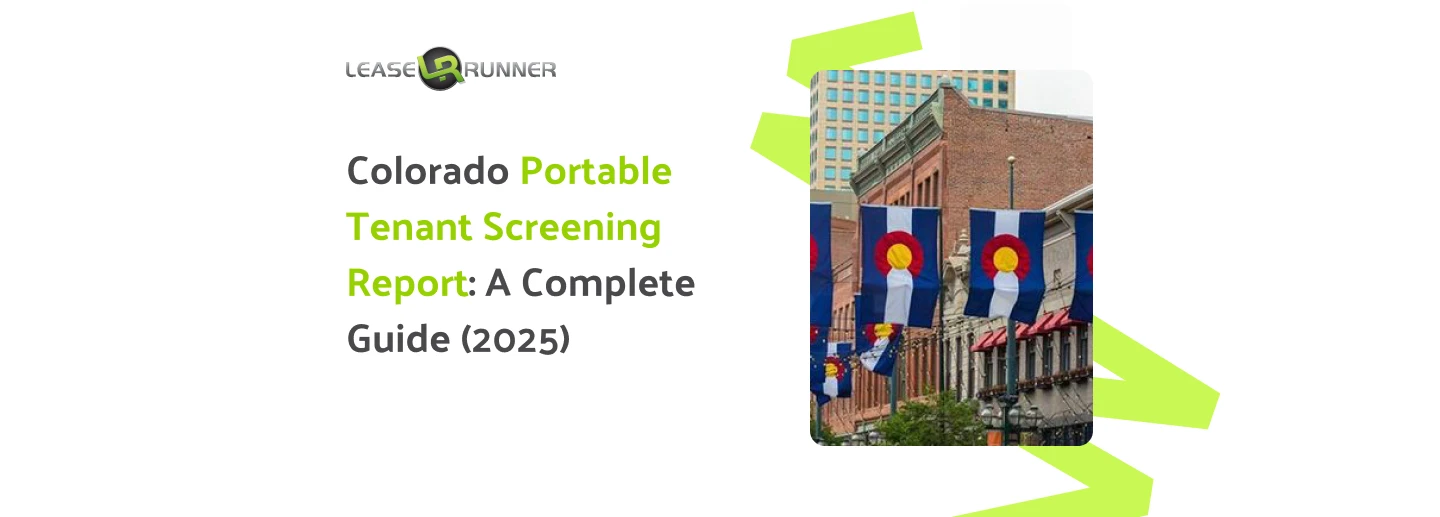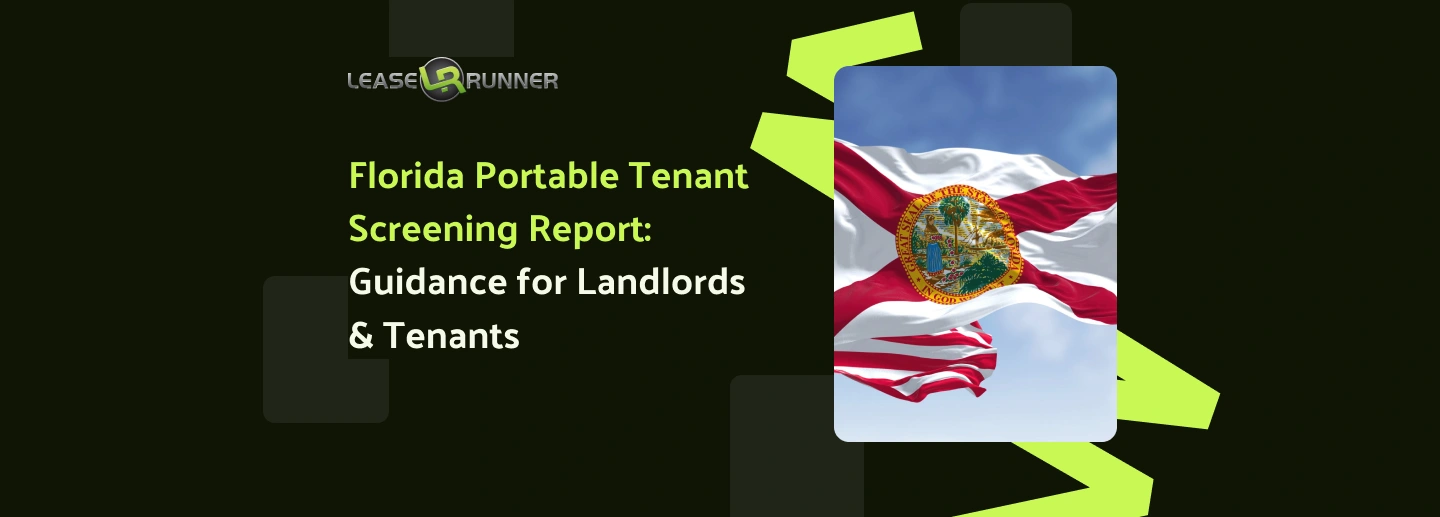
Renting in Colorado just got easier. Thanks to the Colorado Portable Tenant Screening Report, renters no longer have to pay for multiple background checks when applying for different properties. But how does it actually work, and what do both renters and property owners need to know? Let’s break it all down in this article!
What is a Portable Tenant Screening Report?
A Portable Tenant Screening Report (PTSR) is a reusable background check that renters can submit to multiple landlords without paying separate screening fees for each application..
A Portable Tenant Screening Report (PTSR) should contain credit history, eviction record, and criminal record check. Tenants buy the report themselves from an agency that has been approved and send it to landlords.
The report is valid for 30 days, allowing tenants time to search for housing without having to do it all over again. If a landlord refuses an application, a tenant is entitled to protections if they request to view a copy of the report to review or contest mistakes.
Landlords under Colorado law are compelled by statute to accept any valid PTSR conforming to these guidelines and not ask for additional screenings or charge additional fees without good cause.
What Does Colorado PTSR Include?

An acceptable portable tenant screening report must contain the tenant's information:
- Credit Report – A full credit report with one of the major bureaus like Experian, Equifax, or TransUnion. It indicates payment history, amounts owed, and usage ratios. For instance, steady on-time payments reflect responsible use of credit, but a history of previous delinquencies may influence approval.
- Criminal Background Check – History of convictions or established criminal activity. Landlords use this to determine potential risk at the location. Minor or past incidents are sometimes viewed differently from the last or the worst, so context is crucial.
- Eviction History – Information on previous evictions, court, and rental issues. An eviction that had been filed years ago would not be as effective as a recent one. This history informs landlords of rental tendencies and whether the tenant has experienced default on lease payments.
- Verification of Income & Employment – Evidence of current employment and regular sources of income in order to establish that rent can be paid monthly. Recent pay stubs, tax returns, or employer verification letters are examples. Landlords usually ask for multiples of the monthly rent as specified, except where subsidy rules are involved.
- Rental History – References from past landlords and prior leases, such as a lease agreement in Colorado. It shows how well a tenant paid rent, cared for the unit, and followed property rules. A strong history can balance weaker areas in the report.
Key Updates to Colorado Tenant Screening Laws in 2025
Recent changes in Colorado law mark a turning point for renters. State lawmakers now focus on stronger renter protections, reducing barriers, and promoting housing fairness.
HB23-1099 (2023 recap)
The 2023 rule, HB23-1099, created big changes. Landlords in Colorado must accept a Portable Tenant Screening Report (PTSR) from renters. Agencies that verify identity and run background checks provide these reports.
No extra application fees can be charged for background checks if a tenant provides a valid PTSR. Reports also remain valid for up to 30 days, meaning renters avoid repeated fees and questions when applying for different properties.
HB25-1236 (2025 updates)
New rules for Colorado Tenant Screening Laws in HB25-1236 take effect in 2025. The PTSR's validity must be completed within the previous 30 days. For renters using housing subsidies, like Section 8 vouchers, the law removes requirements for landlords to look at credit history, credit score, or negative credit events.
Adverse credit events are specifically addressed by HB25-1236, which severely restricts a landlord's ability to use them during the screening of applicants who have a housing subsidy. An adverse credit event is defined in the bill as anything that can harm a person's credit, such as past-due rent payments or debt collections.
In real terms, a landlord in Colorado cannot deny someone a home because of past credit issues when the tenant pays with a subsidy. Even if a renter faced eviction or late payments, landlords must ignore these credit issues during the screening process. This change lifts many barriers for people seeking safe, affordable housing.
Broader Renters’ Rights Bill 2025
Colorado has made significant changes to renters' rights, with new laws providing more protection and clearer guidelines for tenants. In 2025, the state introduced several updates to make rental agreements fairer and transparent, while also giving tenants more control.
- Security Deposit Changes: House Bill 25-1249 caps security deposits at one month's rent, ensuring affordability for tenants. Additionally, landlords must allow tenants to pay deposits in installments over six months, or fewer if the tenant requests it. Tenants now have stronger protections against unfair deductions for normal wear and tear, including items like faded paint or worn carpet. Landlords must return security deposits within one month, or up to 60 days as specified in the lease. If they withhold deposits wrongfully, tenants can pursue three times the amount of the deposit, plus legal fees.
- Habitability Standards Improve: Landlords must fix serious health and safety issues within 24 hours of being notified. For less urgent issues, they have up to 96 hours. Leases must now include clear instructions, in both English and Spanish, on how tenants can report problems. If a problem is bad enough to force a tenant out of their home, landlords must provide alternative housing, like a hotel room, at their cost for up to 60 days. Landlords cannot retaliate against tenants for reporting unsafe conditions . For more details on landlord responsibilities, visit Colorado Habitability Law.
- Anti-Discrimination Protections expand: Landlords cannot refuse tenants using housing assistance like Section 8 vouchers, thanks to House Bill 25-1240. Survivors of gender-based violence can now leave their leases early without penalty and cannot be evicted due to financial hardship from abuse. Publicly funded housing must allow pets, with no breed or weight restrictions.
- Eviction and Rent Increase Rules: Landlords must have a valid reason to evict tenants, such as major repairs or personal use of the property. Landlords cannot evict tenants just for unpaid late fees. Local governments and the Attorney General now have more power to enforce landlord-tenant laws.
- Pricing is more transparent: Landlords can no longer use third parties to coordinate rental prices with competitors. Landlords must show all costs clearly in rental agreements, without hidden fees.
- Tenant Screening and Lease Changes: Landlords must count only the rent the tenant pays when considering tenants who receive housing assistance. The tenant’s income must not exceed twice the rent amount (landlords typically work with 3x the rent). The new laws also require landlords to provide clear notice before evicting tenants and to follow fair steps.
Landlords have more duties now. They must keep the property in good condition. They cannot discriminate against tenants. If they break these rules, they can face fines or lawsuits.
Benefits of Colorado Portable Tenant Screening Reports in 2025
Portable Tenant Screening Reports (PTSR) offer many helpful changes for renters and landlords in Colorado. These reports lower costs, make the process clearer, and help the rental system work better for everyone.
Benefits of Colorado Portable Tenant Screening Reports For Renters:
With a Portable Tenant Screening Report, tenants pay less, apply quicker, and have greater control over their rental experience.
- Eliminates redundant screening fees: A single report can be utilized for several properties, saving the unnecessary cost of having to buy new screening fees and even security deposits every time. This saves the renters money and lessens financial strain.
- Speeds up rental applications: Valid reports speed up the process. Landlords spend less time conducting background checks, so tenants receive word faster. This is important for people who require a residence in a timely manner.
- More control and transparency: The tenants can view and verify their reports. They can then correct any errors beforehand, thereby making the system more transparent and equal.
- Simplifies renting: Screening done ahead of time means renters face fewer problems during their applications. This makes renting easier and less stressful.
Benefits of Colorado Portable Tenant Screening Reports For Landlords:
Landlords benefit from using Portable Tenant Screening Reports by saving time, widening their pool of applicants, and meeting state laws.
- Saves time and effort: Landlords save time and effort by not repeating the same credit and background checks. Using a verified PTSR speeds up tenant review and selection.
- Expands applicant pool: Accepting PTSRs helps landlords reach more renters. It lowers barriers for applicants who can’t pay many fees, expanding the pool of good tenants.
- Legal compliance: Accepting PTSRs prevents landlords from violating Colorado HB23-1099..This helps landlords stay clear of penalties and legal issues.
- Reduces administrative work: PTSRs cut down on paperwork and follow-up work. This frees up landlords to spend more time on their property.
- Supports fair housing practices: Honest and equitable screening preserves tenants' rights and prevents discrimination lawsuits, upholding the integrity of landlords.
How To Get A Portable Tenant Screening Report Colorado (2025 Guide)

Overall, the process is simple but requires a few key steps.
Getting a Portable Tenant Screening Report (PTSR) in Colorado has become easier and more important under the state's updated rental rules. Overall, the process is simple but requires a few key steps.
Choose a Compliant Screening Service
Start with a screening company that follows Colorado laws. Not all offer acceptable portable tenant screening reports. A valid report must show the tenant’s verified identity, background check, and credit report, in line with Colorado tenant screening laws.
Using a trusted service like LeaseRunner can help ensure your report meets these requirements. If you wonder where to get a portable tenant screening report with easy steps and clear support, LeaseRunner is a reliable choice.
Provide proper information
Supplying accurate and complete information is key. Renters must give full details such as legal name, current address, and identification proof. Providing wrong or missing data may delay the report or cause errors.
A proper PTSR includes the tenant’s full background and credit status, ensuring landlords receive the right information as expected by law.
Review and share reports with landlords
After you get the report, check it carefully for errors or outdated facts. Fixing mistakes early helps keep your report clean. Sharing the PTSR with many landlords during its valid period saves money and speeds up the rental process.
Being able to reuse the report is one of the biggest benefits of getting a portable tenant screening report in Colorado.
Keep information updated
Maintaining current personal and financial information helps renters avoid issues later. If details change, especially contact or income info, renters need to update the screening service. Up-to-date data protects rental chances and ensures landlords see the newest status on applications.
How To Accept Colorado Portable Tenant Screening Reports As A Landlord
Landlords must understand how to properly accept Portable Tenant Screening Reports (PTSRs) to follow Colorado laws. Doing this correctly ensures fair treatment of applicants and avoids costly legal issues. This section explains the key steps landlords need to take when reviewing and accepting PTSRs.
How Colorado Landlords Can Accept Portable Tenant Screening Reports
Landlords in Colorado must accept a PTSR as long as it meets legal criteria, but that doesn’t mean they can’t properly evaluate the report before making a leasing decision.
Here’s how landlords should handle portable reports:
- First, update your listing or rental application process to acknowledge PTSRs. Many tenants may not even realize they have the right to submit one, so make it clear by stating: “We accept valid Portable Tenant Screening Reports (PTSRs) as defined by Colorado law.”
- Next, when you receive a PTSR Colorado, don’t just assume it’s valid — verify the details. Colorado law requires the report to be less than 30 days old and issued by a Consumer Reporting Agency (CRA) that follows the Fair Credit Reporting Act (FCRA).
- Finally, even though you must accept a valid PTSR, you still have the right to review it just like you would any other screening report. Suppose a tenant has a poor credit history, multiple evictions, or other red flags. In that case, you can deny their application based on your standard rental criteria, as long as you apply those same criteria fairly to all applicants.
5 Legal Steps to Accept Portable Reports
Accepting a Portable Tenant Screening Report (PTSR) in Colorado requires you to understand the process thoroughly.
- Verify the Report’s Age (Must Be Recent): A PTSR Colorado is only valid if it’s less than 30 days old. So, remember to double-check the date on the report. If it’s more than 30 days old, you can legally request that the tenant provide an updated report.
- Confirm the Source of the Report: Ensure the report comes from a recognized agency like Experian, TransUnion, or Equifax.
- Check for Required Information: Review the PTSR carefully. Make sure it has all necessary sections, and if something is missing or incomplete, request a more comprehensive report.
- Apply Consistent Screening Standards: Establish clear and consistent criteria for screening tenants (such as minimum credit scores, income levels, and no history of evictions), and apply them equally to everyone.
- Keep Records for Legal Protection: Store the PTSRs and any related documentation in an organized way for at least one year.
Tips to Evaluate a Portable Tenant Screening Report For Landlords
When reviewing a Colorado Portable Tenant Screening Report for potential tenants, it's crucial to thoroughly examine several key areas.
First, assess the credit score and payment history, focusing on consistent on-time payments and being cautious of applicants with significant delinquencies. Next, evaluate the rental history, noting any past evictions, lease violations, or disputes with landlords that could indicate potential issues.
Finally, consider the applicant's criminal background, recognizing that while minor offenses may not necessarily disqualify someone, serious criminal history can be a concerning indicator.
Conclusion
The Colorado Portable Tenant Screening Report is reshaping the way tenants and landlords interact. Take advantage of this tool to stay ahead in the competitive rental market while promoting fairness and efficiency across the board.
With LeaseRunner, you can securely accept PTSRs, run compliant screenings, and streamline your rental process—all in one platform. Try LeaseRunner today to simplify tenant screening and stay fully compliant with Colorado law.
FAQs
Q1: Where Can I Get a Portable Tenant Screening Report?
You can obtain a Portable Tenant Screening Report (PTSR) from any Consumer Reporting Agency (CRA) that complies with the Fair Credit Reporting Act (FCRA) such as LeaseRunner.com
Q2: How Can Tenants Submit a Portable Tenant Screening Report to a Landlord?
Once tenants have obtained their PTSR from a valid CRA, they can submit it electronically or provide a physical copy to the landlord during the application process. Many property managers have portals or email addresses specifically for submitting PTSRs. It’s important to ensure that the report is less than 30 days old at the time of submission to be considered valid.


Get Your Full
Colorado PTSR Report
in minutes
Whether you're a landlord or a tenant, we all need PTSR







